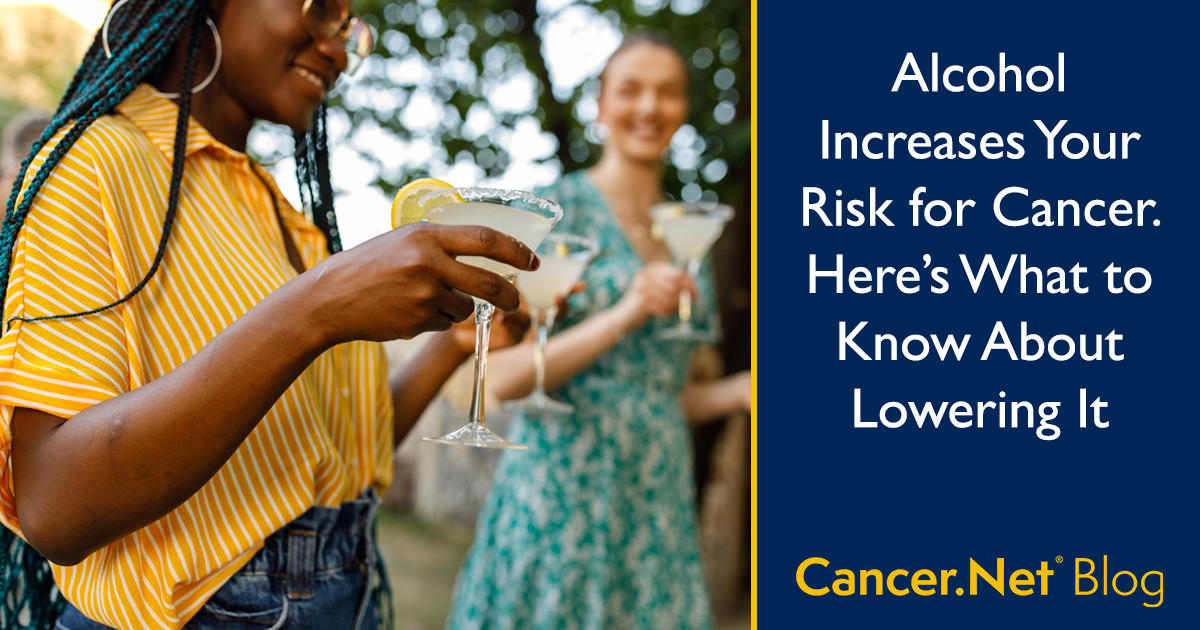
Eleonora Teplinsky, MD, is the head of breast and gynecologic medical oncology at Valley-Mount Sinai Comprehensive Cancer Care in Paramus, New Jersey, and is a clinical assistant professor of medicine at the Icahn School of Medicine at Mount Sinai. She specializes in the treatment of breast and gynecologic cancers. Her research interests focus on the role of exercise and nutrition in cancer, social media in oncology, and survivorship. Dr. Teplinsky is also a member of the Cancer.Net Editorial Board. You can follow Dr. Teplinsky on X, formerly known as Twitter. View Dr. Teplinsky’s disclosures.
In the United States, alcohol consumption accounts for approximately 6% of all cancers diagnosed and 4% of all cancer deaths, according to the American Cancer Society (ACS). Yet alcohol use is also one of the risk factors for cancer that we have the power to change.
Alcohol is classified by the International Agency for Research on Cancer as a Group 1 carcinogen. A carcinogen is any substance known to cause cancer. Carcinogens classified in Group 1, which also includes asbestos, radiation, and tobacco, have the highest risk of causing cancer.
Alcohol consumption is a risk factor for several different types of cancer, such as cancers of the head and neck, including the mouth, throat (pharynx), and voice box (larynx); breast cancer; and cancers of the gastrointestinal tract, including esophageal cancer, liver cancer, and colorectal cancer. Alcohol may be linked with other cancers as well, such as melanoma, prostate cancer, and pancreatic cancer. While the risk of developing cancer increases with higher alcohol consumption, imbibing any amount of alcohol increases this risk, regardless of the type of alcohol consumed.
Here, learn more about what causes alcohol to increase your cancer risk, why limiting or stopping alcohol use can help lower this risk, steps you can take to do so, and what people with cancer and survivors should know about drinking alcohol.
How does drinking alcohol increase your risk for cancer?
Alcohol can increase your cancer risk in multiple ways, although some of the mechanisms are not yet well understood. Some of the ways alcohol can increase your cancer risk include:
-
Damage to DNA. Ethanol, which is one of the main components found in most types of alcoholic beverages, is broken down in your body to acetaldehyde. Acetaldehyde is a chemical that can damage DNA and is classified as a probable human carcinogen. Over time, the accumulation of DNA damage can lead to cancer. Additionally, alcohol can create oxidative stress in cells, which happens when there are too many free radicals and not enough antioxidants in your body. This can cause DNA damage and lead to the production of “reactive oxygen species,” a type of free radical that can also lead to cell damage and increased cancer risk.
-
Damage to the liver. Alcohol and its byproducts can damage the liver, which can lead to inflammation and cirrhosis, or scarring of the liver. Cirrhosis is a known risk factor for liver cancer.
-
Impacting the body’s ability to break down harmful chemicals and absorb helpful nutrients. Together, this can help other chemicals, such as those found in tobacco smoke, enter the body more easily.
-
Raising estrogen levels. Alcohol can raise estrogen levels, which can impact a person’s risk for breast cancer.
-
Exposure to carcinogenic contaminants. Contaminants can be introduced to alcohol during the fermentation and production processes. Some of these contaminants can include nitrosamines, phenols, and hydrocarbons.
A person’s genetic predisposition may also increase their risk of cancer from alcohol consumption. For example, the acetaldehyde generated when the body breaks down alcohol is eliminated by an enzyme called aldehyde dehydrogenase-2 (ALDH2). Some people have a genetic variant where they have an inactive form of ALDH2, which means they have an excessive accumulation of acetaldehyde. This excess accumulation has been associated with higher cancer risk.
Can stopping or reducing alcohol use lower your risk for cancer?
The risk of developing an alcohol-associated cancer depends on the type of cancer and increases with increasing alcohol consumption over time. While stopping or reducing alcohol consumption is not immediately associated with a reduction in cancer risk, the risk does eventually decline over time.
ACS guidelines state that it is best not to drink alcohol. For people who do choose to drink alcohol, both the American Society of Clinical Oncology (ASCO) and ACS suggest that they should limit their intake to no more than 2 drinks per day for men and 1 drink per day for women. It is important to remember that even light alcohol consumption is associated with increased cancer risk, so it is best to limit your alcohol intake as much as possible. The National Institute of Alcohol Abuse and Alcoholism (NIAAA) defines a standard drink as one that contains approximately 14 grams of pure alcohol, which is the equivalent of 1.5 ounces of distilled spirits, 5 ounces of wine, or 12 ounces of regular beer. Yet, many people and institutions are unaware of these measurements, so alcohol serving sizes often exceed 1 standard drink.
How can you stop or limit alcohol consumption?
There are several ways to limit or eliminate alcohol consumption. First, it is important to figure out why you are drinking alcohol, especially if you are drinking excessively. This is often referred to as “heavy drinking” or “binge drinking.” Heavy drinking is defined as 8 or more drinks per week for women and 15 or more drinks per week for men. Binge drinking is defined as 4 or more drinks on a single occasion for a woman and 5 or more drinks on a single occasion for a man.
Identifying behaviors, patterns, thoughts, or actions leading you to alcohol consumption is important. Very commonly, people use alcohol as a coping mechanism, for relaxation, for anxiety management, or to reduce stress, as alcohol can slow down the central nervous system and reduce inhibition, judgment, and memory. Talking to a health care professional can be a helpful starting point to identify other coping mechanisms and methods for reducing stress and anxiety.
Similarly, some people with insomnia use alcohol to help them sleep. Yet, alcohol can actually worsen sleep. It is important to know that there are many other ways to treat insomnia that do not include alcohol. Talk with your health care provider if you find yourself relying on alcohol to help you sleep.
Breaking the habit loop of alcohol consumption can be challenging, but it is doable. Setting boundaries regarding alcohol intake is important, as is having a plan for alcohol consumption ahead of social gatherings. For example, in a social situation where someone may feel uncomfortable not drinking or talking about their decision not to drink, having a “mocktail” can be a great alternative.
There are many in-person and virtual resources and support groups available for people trying to cut down or quit drinking alcohol. Talk with your doctor if you need support with stopping alcohol use.
What should people with cancer and cancer survivors know about alcohol consumption?
Although the data for alcohol consumption in cancer survivors is more limited than the data for alcohol consumption and cancer risk, alcohol intake may affect your risk for cancer recurrence and overall survival. However, this varies for different types of cancer. Furthermore, while there is limited data in certain cancer types, there is not enough scientific evidence for an overall association found between alcohol intake and cancer-specific death. Because of this, there are not yet general recommendations for alcohol intake specifically for cancer survivors. Limiting alcohol intake may, however, help reduce the risk of a second cancer diagnosis and have a beneficial impact on your health in other ways.
It is important to talk with your doctor about your alcohol intake and ask whether there are any specific recommendations around alcohol consumption based on your specific cancer type, its stage, the treatments you’ve received, and your prognosis. Your health care team can help you navigate your alcohol intake and provide helpful ways to limit or eliminate alcohol consumption if needed.





